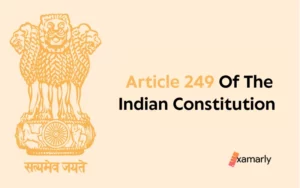“Can an average student crack UPSC?” – A question that is frequently asked by many aspirants.
UPSC is the toughest exam where applicants are way more in number than seats. Well, you can start thinking about this question by knowing “What kind of aspirants qualifies for UPSC?”
UPSC is not seeking any academic record holder. If this would be the case then the most difficult exam would not be framed in the first place. UPSC is a national-level exam that wants one who can think in a multifaceted way to overcome any difficult situation.
So yes anyone (whether achiever or non-achiever) can clear UPSC civil services exam because problem-solving and decision-making are the skill sets and attributes that are looked out for!
If you are not a high-percentage holder, don’t worry at all. If it’s your dream to be a future administrative officer, then your (past) academic rank won’t hold you back. In terms of educational qualifications, the only requirement is graduation.
An aspirant must know what is driving him or her to appear for UPSC CSE. There is no tie-in between UPSC Exam Preparation and your past academic performance. Nothing can halt the candidate from achieving success in UPSC if he/she is determined to succeed.
By following a positive approach toward your goal and having faith in yourself, you will be able to clear the UPSC exam.
- Civil Servants: Role Models for Average Students to Clear UPSC Exam
- Does Academic Achievement Hold more Weight than the Selection Process?
- Tips and Tricks for an Average Student to Crack UPSC Exam
- Don't Do These If You Are Preparing for UPSC
- Conclusion
- Frequently Asked Questions
- Can an average student crack the UPSC exam?
- Is it possible for a student with average marks to clear the UPSC exam?
- Can someone with average intelligence crack the UPSC exam?
- What is the success rate of an average student in the UPSC?
- How to prepare for the UPSC as an average student?
- What are the tips for an average student to crack the UPSC?
- How much time does it take for an average student to crack the UPSC?
Civil Servants: Role Models for Average Students to Clear UPSC Exam
The Civil Services Exam is the toughest so it is indispensable to wonder, “Can an average student crack UPSC?”
Many were average in their school or college but that never stopped them. Many ‘average’ students cleared the IAS exam on their first try. Like:
Himanshu Kaushik has secured an AIR 77 in his first attempt at UPSC 2017. According to him, one needs to be focused on learning and should avoid all negativity.
Israel Jeba Singh has secured an AIR 59 in UPSC 2004. In his interview, he remarked, “Being passionate about something is what matters the most when you want to make a change in it. No matter what your grades are, you will achieve it if you continue to have the fire.”
How Can an Average Student Commence Preparation?
Don’t dwell on the past: First of all, ignore your average grade history and stop giving an excuse that you are average. No one in this world is perfect. We all commit mistakes. So just stick to your dream and move forward. Leaving the past behind is the key to success.
Plan your strategy: To sketch out the strategy or the study schedule you need to go to the syllabus and the previous year’s paper to understand the exam pattern and structure of the questions. Plan your schedule in such a way as to go through the vast UPSC Syllabus at least twice, revise it a couple of times and practice enough mock tests and previous year’s papers. Planning out your strategy and sticking to it is key to candidate success.
Divide the syllabus: Divide UPSC Syllabus into chunks so that you can build a solid grip on what you have studied. As research suggests that smaller portions are easier to understand compared to the bigger portion in one go. Dividing and studying according to the syllabus with determination can make your dream come true.
Does Academic Achievement Hold more Weight than the Selection Process?
Factors that Success Depends upon
Academic records or marks are not true to scale your capabilities. Some of the factors are listed below on which success in the UPSC civil services examination depends:
- Hunger to Achieve: Hunger, for it motivates you to study more consistently. In short, Your hunger to taste success can change you from being average to a topper. Even if you are a below-average student, you can definitely crack UPSC if you have a hunger to win.
- Interest: If you have a keen interest and strong desire for IAS, then you can study smoothly by crossing every hurdle that comes your way. Your interpersonal skills play a vital role in cracking the exam.
- Consistency: Although achievable, there are no shortcuts to success in this tough exam. Consistency is another important factor that inculcates the character of discipline, boosts confidence level, and resists you from being under pressure. The IAS examination is structured in such a way that it tests consistency.
- Perseverance: It is important as it enables you to overcome obstacles and aids you to step forward toward your goal by building your inner strength. Your preparation level and hard work should increase day by day.
Tips and Tricks for an Average Student to Crack UPSC Exam
- Start Early: Start preparing for the IAS exam as early as possible to give yourself enough time to cover all the topics and revise them multiple times. You can also start your preparation with a reputed coaching institute.
- Create a Study Plan: Make a study plan that is realistic, feasible, and suits your learning style. Make sure to allocate enough time to each subject and stick to the plan. Effective time management will help you crack UPSC fast.
- Focus on NCERT Books: NCERT books are considered the backbone of the IAS exam. Make sure to thoroughly read and understand all the NCERT books from Class 6th to 12th.
- Read Newspapers Daily: Reading English and Hindi newspapers daily can help in developing your language skills, as well as staying updated on current affairs. Your knowledge over time will improve by reading newspapers
- Solve Previous Year Question Papers: Solving previous year question papers can help you understand the exam pattern, familiarize yourself with the type of questions asked, and improve your time management skills.
- Stay Focused: Staying focused and avoiding distractions is crucial for success in the IAS exam. Find a study environment that is conducive to your learning and avoid wasting time on social media, gaming, or other leisure activities.
- Seek Help When Needed: Don’t hesitate to seek help from teachers, mentors, or friends when you are struggling with a particular topic.
- Take Breaks and Stay Physically Active: Taking breaks and staying physically active is important for your mental and physical health. Make sure to take breaks and engage in physical activities to avoid burnout.
- Stay Positive and Confident: Maintaining a positive attitude and confidence is key to success in the IAS exam. Believe in yourself and your abilities, and keep a growth mindset.
Don’t Do These If You Are Preparing for UPSC
If you are preparing for the UPSC exam, you should avoid the following:
- Procrastination: Do not delay your preparation and start studying as early as possible.
- Underestimating the Syllabus: Do not underestimate the syllabus as it is vast and requires thorough preparation.
- Cramming: Do not rely on rote learning or cramming as it is not an effective way to retain information for the long term.
- Ignoring Current Affairs: Do not ignore current affairs as it is an important component of the exam and requires regular updates.
- Neglecting Physical and Mental Health: Do not neglect your physical and mental health, as stress and burnout can affect your performance.
- Not Seeking Help When Needed: Do not hesitate to seek help from mentors, teachers, or friends if you are struggling with a particular topic.
- Overloading Yourself: Do not overload yourself with too many books or materials. Stick to the essential study materials and avoid overburdening yourself.
- Not Practicing Previous Year Question Papers: Do not ignore the importance of solving previous year question papers as it helps in understanding the exam pattern and improving time management skills.
- Skipping Revision: Do not skip revision as it is an important part of the preparation and helps in retaining information.
Conclusion
Remember it is we who resist ourselves in accomplishing our dreams. The limitations or the constraints that we talk about are only prevailing in our minds.
So just break the barrier and with your hard work hold your dream to your path of success. We at this stage are well equipped with the knowledge we gain in academics.
Just think about the skills you have, the work you are determined to put in, and the time you’re willing to dedicate, and you’re good to go!
Can an average student crack UPSC exams on their 1st attempt? Yes, they definitely can. UPSC is not only for bright students.
Frequently Asked Questions
Can an average student crack the UPSC exam?
Yes, an average student can crack the UPSC exam with hard work, dedication, and smart study hours and plans.
Is it possible for a student with average marks to clear the UPSC exam?
Yes, students with average marks have cleared the UPSC exam in the past with the right preparation and effort.
Can someone with average intelligence crack the UPSC exam?
Intelligence is just one of the many factors that contribute to success in the UPSC exam. Hard work, dedication, and a smart study plan can help someone with average intelligence crack the exam.
What is the success rate of an average student in the UPSC?
The success rate of an average student in the UPSC depends on various factors such as preparation, effort, and study strategy. With hard work and dedication, an average student can increase their chances of success in the exam.
How to prepare for the UPSC as an average student?
As an average student, you can prepare for the UPSC by creating a realistic study plan, focusing on NCERT books, reading newspapers, solving previous year’s question papers, seeking help when needed, taking breaks, and staying positive and confident.
What are the tips for an average student to crack the UPSC?
Some tips for an average student to crack the UPSC include starting early, creating a study plan, focusing on NCERT books, reading newspapers, solving previous year’s question papers, staying focused, seeking help when needed, taking breaks, and staying positive and confident.
How much time does it take for an average student to crack the UPSC?
The time it takes for an average student to crack the UPSC depends on various factors such as preparation, effort, and study strategy. On average, students take 1-2 years of dedicated preparation to crack the exam.






